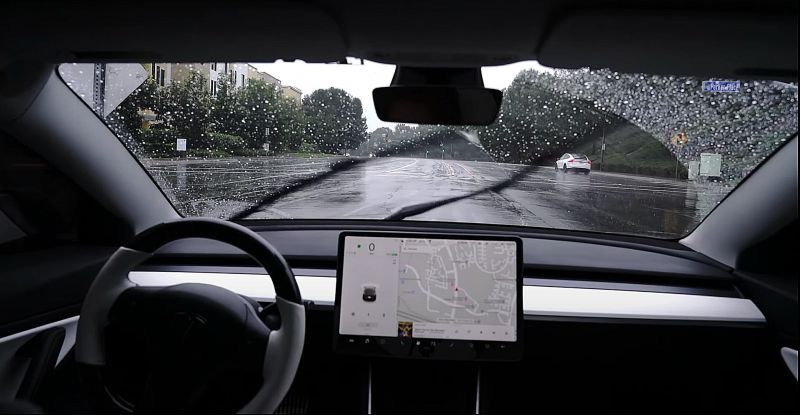Tesla is ‘Virtually Recalling' 26,047 China-made Model 3, Model Y Vehicles to Fix Heat Pump Software
【Summary】Electric automaker Tesla is recalling another 26,000+ vehicles in China due to malfunctioning heat pumps which can lead to inefficient heating of the cabin and affects the performance of the windshield defoggers. All of the vehicles will receive an over-the-air (OTA) software update to fix software that controls the operation of the heat pump.

Electric automaker Tesla is recalling another 26,000+ vehicles in China due to malfunctioning heat pumps which can lead to inefficient heating of the cabin which affects the performance of the windshield defoggers.
All of the vehicles will receive an over-the-air (OTA) software update to fix software that controls the operation of the heat pump, the South China Morning Post reports.
As a pioneer in the development of software-defined vehicles, this latest recall will be a "virtual" one for Tesla, as the repairs can be done remotely with owners having to take their vehicles in for service.
The updated software will be delivered to 12,003 Model 3 electric sedans and 14,044 Model Y SUVs built at Tesal's Shanghai factory from Dec 28, 2020 through Jan 15, 2022, according to a statement from China's State Administration for Market Regulation (SAMR).
In Tesla vehicles with a heat pump, the automaker said the Electronic Expansion Valve (EXV) may experience controller communication interruptions. If this occurs, the software-controlled EXV driver may attempt to realign itself. If this occurs, the vehicle software does not close the valve, which may cause an unintended "valve opening event", according to technical documents filed with the U.S. National Highway Traffic Safety Administration (NHTSA).
The problem can lead to refrigerant becoming trapped in the evaporator. The trapped refrigerant can cause decreased performance of the air conditioning system, which can be sufficient enough to reduce the windshield defogger performance.
The problem surfaced after a software update in December. Shortly after the update, Tesla began receiving complaints from customers who brought their cars in for service complaining of a loss of heating performance in extreme cold weather conditions. An investigation into potential causes then began.
Tesla is also under investigation by the U.S. National Highway Traffic Safety Administration (NHTSA) after reports of customers in Canada having the same problems with the heat pumps in their vehicles. The problem is exacerbated in extremely cold temperatures, where the heat pump is used to quickly defrost the windows.
A number of Tesla owners have complained that the heat pumps failed to operate properly in extreme cold temperatures, according to website Drive Tesla Canada. The Tesla owners were left without adequate heat in temperatures as low as -40 degrees Celsius. Some of these owners lodged complaints directly with Transport Canada.
Transport Canada said it is concerned that a malfunctioning heating and air-conditioning system "may affect windshield defogging/defrosting and therefore driver visibility."
The heat pump in the Tesla's Model 3 and Model Y works like an air conditioner condenser, except in reverse. Instead of removing heat like an air conditioning system does, the heat pump transfers heat into the cabin.
Tesla also used a liquid cooling system for the battery pack. Some of the heat generated by the batteries is redirected into the cabin in cold weather using what Tesla calls an "Octavalve" that uses liquid coolant.
Last month, Tesla said it will resolve the glitch causing the heat pump to malfunction with a software patch. Tesla Chief Executive Elon Musk shared his thoughts on the issue.
Musk said that resolving the faulty heat pump problem remains a high priority for Tesla. He also announced in January that Tesla would release a firmware update to recalibrate the operation of the heat pump expansion valve.
-

Two Ford Crown Victorias Still Operating as Taxis in NYC
-

Mazda CEO's Opinion on EV Adoption in the U.S.
-

Hyundai's revolutionary powertrain design
-

Sustainability focus urged by Michelin Fleet Panel
-

BM Catalysts' UK Expansion
-

Warwick University's £12m funding for electric vehicle battery progress
-

Executive X Series: Unveiling the Powerful City/Vios Competitor
-

Hollywood couple defies expectations, showing affection after 20 years
- Mercedes-Benz is Partnering with Game Engine Developer Unity Technologies to Create Immersive, 3D Infotainment Screens and Displays for its Future Vehicles
- The World’s Biggest Battery Producer CATL Signs MoU with EV Startup VinFast to Develop a ‘Skateboard’ Electric Vehicle Platform
- Foxconn-led Mobility in Harmony Consortium Announces ‘Project X’, an Open, Modular Electric Vehicle Platform
- New Intelligent EV Company JiDU Reveals its Revolutionary Concept Production 'Robocar'
- Hyundai and Michelin to Develop Next-Gen Tires for EVs
- EV Charging Provider Electrify America Raises $450 Million, Siemens to Become a Minority Shareholder
- New Senate Deal Would Expand EV Tax Credits
- Volvo’s Parent Company Geely Launches a New Outdoor Lifestyle EV Brand Named 'RADAR'
- SiLC Technologies Launches its Eyeonic Vision System, a LiDAR Sensor That Can Identify Objects up to 1 Kilometer Away
- Mercedes-Benz Begins Production of the Highly Anticipated EQS Electric SUV in Alabama



















 About Us
About Us Contact Us
Contact Us Careers
Careers